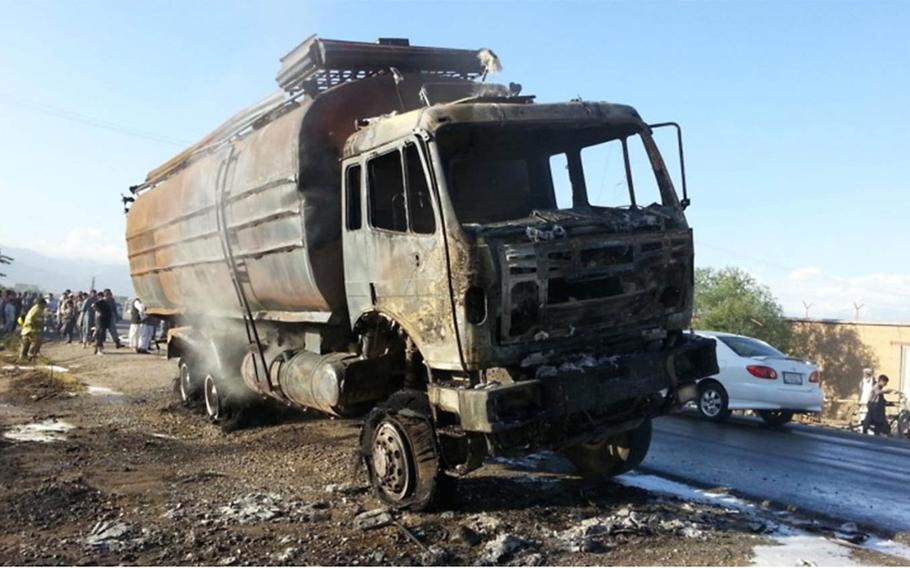
A burned fuel tanker after an attack on a truck convoy bound for a coalition military base in Afghanistan. Afghan trucking officials say attacks have increased in the last year, though Afghan government and coalition military officials dispute this claim. (Courtesy Faisal Mohammadi Group)
KABUL — The already dangerous roads of Afghanistan may be getting even dicier for drivers carrying goods for coalition military forces: Afghan trucking officials say that attacks on their vehicles have skyrocketed in the past year, since they were forced to switch from private security to government escorts.
Nearly 13 years after the U.S. military invaded Afghanistan and ousted the ruling Taliban — and seven months before all foreign combat troops leave the country — major city centers are generally calm. But much of the road network is still riven by regular Taliban attacks, fake checkpoints and warlords demanding tribute. Insurgents have also regularly used magnetic bombs, which they surreptitiously attach to trucks.
The ramifications go far beyond the bottom line of individual companies — the security of Afghanistan’s primitive road network is crucial to improving the country’s struggling, aid-dependent economy as international military forces withdraw and international donor money begins to dry up.
Trucking executives put the blame squarely on the Afghan Public Protection Force, the government-run security service established in 2010 after President Hamid Karzai outlawed private armed security firms, alleging they were paying off the Taliban not to target their convoys, staging attacks to drum up business and generally operating outside the law.
Truckers and industry officials say not only has government security failed to protect them in the year since the APPF took over convoy escort duties, but that the guards themselves sometimes loot their trucks after attacks.
“The APPF has completely failed in their duty,” said Habib-ur-Rahman, who runs Mamakhail Logistics Co. He says his company has had 67 trucks destroyed in the year since APPF took over his convoy security about a year ago.
A July 2013 report from the Special Inspector General for Afghanistan Reconstruction, the top U.S. government watchdog in the country, heavily criticized the APPF for being inept and overpriced.
“APPF officers and noncommissioned officers provided little benefit and were unable to perform required duties,” the report said.
Both ISAF and Afghan government officials dispute the claims, saying such attacks have actually decreased over the past year, although they did not provide statistics to back up that claim.
While banditry is a threat to any truck in Afghanistan, insurgents have focused their efforts on attacking those believed to be carrying goods for foreign military bases. Coalition officials declined to discuss any impact the attacks may be having on the ISAF mission or costs.
“Any operational questions should be directed to the (Afghan Ministry of Interior), as the authority in charge of this security force,” Lt. Cmdr. Jennifer Cragg, ISAF spokeswoman, wrote in an emailed response to Stars and Stripes questions.
Enforcement of Karzai’s security company ban has been uneven, though, and trucking companies say the APPF didn’t take over their convoy security until last spring. They have not been happy with the results: nowadays, being a truck driver has become one of the most dangerous jobs in Afghanistan, which is saying something.
“There is no convoy that doesn’t get attacked,” said Ghafar, a 30-year-old trucker who pointed to facial scars where he was struck by shrapnel during one attack. “What should we do? We must work and feed our children.”
Truckers are not the only ones who have noticed a deterioration of security on Afghanistan’s roads…
Mohammad Akbar, 38, a bus driver who has been driving the Kabul to Kandahar route for nine years said attacks have increased recently and he has witnessed many on the road, which is pocked by bomb craters.
“It’s a big problem — when there are fights the journey takes many hours,” he said.
Habib-ur-Rahman and several other trucking officials interviewed for this story said their complaints about poor security have gone unheeded.
“We have talked to the Afghan security forces and foreigners but nothing has changed,” he said.
Najib Danish, a spokesman for the Afghan Ministry of the Interior, which oversees the APPF, denied the claims and said road attacks have actually decreased.
“So far we haven’t heard any specific complaints from the companies,” he said. “If any company has any particular and specific complaints with evidence they should share it with us and we will investigate it.”
In addition to security concerns, trucking executives say that since they were made to switch from private security, they have been paying much more for less protection: The price per truck for armed security has gone from $500 to $1,000 per truck with private companies, to about $2,200 per truck for the APPF. That’s in addition to the losses involved when trucks are destroyed, in which case companies must often swallow the costs, which can be $100,000 for a single fuel tanker.
And because of the increased danger, trucking officials say, it’s becoming harder to find drivers willing to ply some of the more dangerous routes.
“Our expenses are increasing and our income is decreasing,” said Ahmad Shah, operations manager for the logistics company Faisal Mohammadi Group.
The attacks are not confined to rural back roads in Taliban strongholds. One of the most dangerous routes is one of the busiest — the highway between Kabul and Kandahar, part of the so-called Ring Road that connects much of the country. Other highway routes to eastern cities such as Jalalabad, Maidan Shar and Khost have also seen numerous attacks.
Jawed Jami, Faisal Mohammadi Group’s chief operations officer, looks weary as he rifles off a long list of roads where his trucks have been targeted.
“We are searching for safe roads but we can’t find them,” he said.
Zubair Babakarkhail contributed to this report
druzin.heath@stripes.com Twitter: @Druzin_Stripes